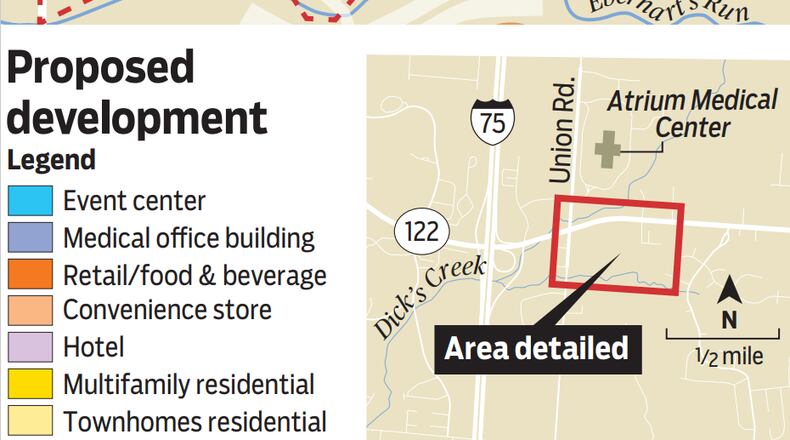The development as proposed will feature a dense array of apartments, townhomes, retail sites, restaurants, offices and a hotel in Warren County’s section of the city, all anchored by an arena and event center. The agreement would see the developer invest $72 million into the site over the course of eight years.
“When you look at an entertainment venue, it’s not necessarily that ARPA (funding) is going to put in 1,000 seats, but there’s infrastructure that the government normally does — (like) if there’s a road that needs to be done specifically for that, or if there’s water or sewer lines. That is a normal, typical government function,” said Warren County Deputy Administrator Martin Russell.
Warren County Democrats don’t believe this project meets ARPA requirements that projects be focused on addressing the pandemic, not general economic development.
“It doesn’t look like, to me, that the Middletown sports complex meets these requirements,” said Warren County Democrat Chair Bethe Goldenfield. “I really don’t see how it applies.”
Goldenfield said while she was pleased to see the county use ARPA funds to expand rural broadband access, she wished that more money had gone toward programs that would go straight to folks who need help paying for energy bills, rent or school supplies, instead of toward large capital expenditures.
Russell said the upcoming Middletown development will supplement the county’s largest industry, tourism, which he said took a large hit during the pandemic when people were less likely to travel.
“The county always, when it comes to tourism, will look to see how it can support large projects that make sure that people continue to come to Warren County, visit Warren County, spend in Warren County, and help all folks rebound based off of that,” Russell said.
ARPA restrictions
U.S. Department of Treasury rules give local governments broad leeway in spending American Rescue Plan funds, noting only a few specifically ineligible uses, such as:
— No payments for debt service and replenishments of rainy day funds
— No satisfaction of settlements and judgments
— No uses that violate conflict of interest requirements or federal, state or local law
The rules generally say uses have to support ARPA’s stated purpose of addressing the COVID pandemic, particularly in marginalized communities. Under the section on capital projects, it says Treasury presumes the following projects are ineligible;
— Construction of new correctional facilities as a response to an increase in rate of crime
— Construction of new congregate facilities to decrease spread of COVID-19 in the facility
— Construction of convention centers, stadiums, or other large capital projects intended for general economic development or to aid impacted industries
In the section of rules regarding negative economic impacts, it says: “Note that the final rule maintains that general infrastructure projects, including roads, streets, and surface transportation infrastructure, would generally not be eligible under this eligible use category, unless the project responded to a specific pandemic public health need or a specific negative economic impact.”
“Similarly, general economic development or workforce development – activities that do not respond to negative economic impacts of the pandemic but rather seek to more generally enhance the jurisdiction’s business climate – would generally not be eligible under this eligible use category.”



